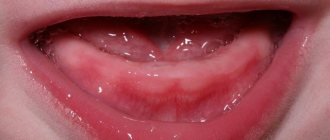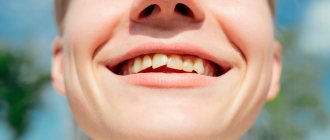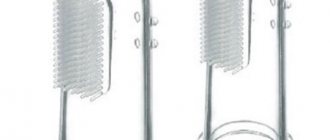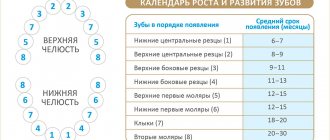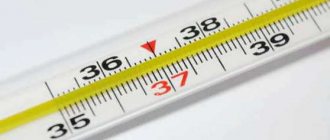Having asked such a question to a search engine, it is not easy to find a useful article that would tell why a child aged 10-11 months has no teeth and what to do in such a situation, why a one-year-old child still has no teeth, or why one should not panic in such a situation. situations. You will come across forums where women who have no idea about medicine try to help each other.
For help with any problem, you should turn to professionals. It is better if it is a doctor, but if he is not nearby, then it is better to trust at least articles that are based on some accurate medical data, especially when it comes to teething in a child at 10-11 months.
Next, we will look at what to do and what to do if your child is already 10 or 11 months old or even a year old, and he still does not have chewing organs, is there any reason to panic in such a situation and what should be done, and what is better? abstain.
Impaired teething
Baby teeth are important for the development of a child and one cannot underestimate how much a child needs them at 10, 11 months, and a year. They allow him to eat adult food, develop and
grow correctly. The development of the facial segment directly depends on how well the chewing apparatus is developed in the child’s mouth.
Eruption disorders are considered a pathology, which includes the absence of teeth at a late age, incorrect eruption sequence, and underdevelopment during their emergence from under the gums.
To better understand what happens in a child's body and how certain factors can affect the chewing organs, it is best to first look at how teeth erupt and where they come from.
Consequences of early destruction of primary teeth
After the early removal of a baby tooth, the gum in its place becomes overgrown, and the permanent one is deprived of its natural landmark. This leads to phenomena such as:
- dystopia - eruption of a permanent tooth outside the dental arch;
- retention - the occurrence of a formed tooth in the thickness of the jaw bone.
If the baby tooth does not receive treatment, and the inflammatory process spreads to its roots, then the permanent follicle located under them is damaged. In this case, the permanent one may die, and then its place in the dentition will remain empty. The absence of a tooth is confirmed by radiography.
Development of the dental apparatus
The digestive system is of central importance in human life, as well as in other creatures. Therefore, organs that belong to the digestive system are formed very early in the process of embryonic development. Already at 3-4 weeks of development, the embryo has an intestinal tube and the rudiment of a mouth, which interests us primarily. At the same time, the development of the dentition begins, the formation of the primary occlusion and the rudiments of permanent teeth.
Milk and permanent teeth are inextricably linked, because until the child grows his first permanent teeth, that is, until he is 6-7 years old, they will be replaced by temporary teeth. By the time of birth, they are well developed and ready to erupt in the near future, but the first ones - not earlier than 10-11 months.
The eruption of chewing organs is probably one of the central events in the life of the baby and his parents, because this process is associated with stress for the child. Parents are also very worried, trying to ease the fate of their baby, but what to do if the due date has come, but the teeth have not erupted?
First, let's define what a “deadline” is in this case. A child’s first teeth appear at 6-8 months of life, although it is possible that they may appear later. Therefore, do not worry if there is a slight delay. The lower jaw will be filled first, followed by the upper jaw. This is necessary for the child to develop a correct bite, that is, the teeth are positioned correctly in relation to each other. You will learn more about the sequence of teething in this table:
Each organism is individual, but there are cases in which parents should pay attention to how their child’s teeth develop:
- delay in teething for more than several months, for example up to a year;
- early dental development;
- the order of eruption at 10 or 11 months is disrupted;
- tooth missing or out of shape at 10 or 11 months;
- The dentition appeared even before the baby was born.
Excessive stress on the baby's psyche
Overexcitement or overtiredness of a child often leads to disruption of the process of falling asleep. To avoid this problem, parents should exclude the influence of negative factors on the baby’s nervous system:
- The following can overstimulate the nervous system: watching cartoons before bedtime, noisy games, so mothers should control what their children do before bedtime.
- The emotional state of the mother affects the quality of the child’s sleep, as her irritability, increased anxiety, and negative emotions affect communication with the baby. Impressionable children suffer from an uncomfortable psychological environment in the family, which can also lead to sleep disorders. A loving, calm mother and harmony in the family are a guarantee of children’s peace of mind and their mental health.
Somatic diseases
To identify somatic problems that lead to sleep disturbances, you should contact your pediatrician. Timely treatment will eliminate the cause and normalize the baby's sleep.
Abdominal colic is a common cause of poor sleep and whims in a child. When the spasms pass, the baby calms down and sleeps peacefully. Such disorders are temporary and are associated with the characteristics of the digestive system of infants.
The most common cause of persistent sleep disorders in children under 1 year of age is rickets. Its development is caused by a deficiency of vitamin D, as a result of which the metabolism of calcium and phosphorus is disrupted. Starting from 3-4 months (sometimes from 1.5 months), signs of increased neuro-reflex excitability appear:
- fearfulness, irritability;
- frequent shuddering, especially when falling asleep;
- severe sleep disorders;
- increased sweating during feeding and sleep.
The child's condition improves after the pediatrician prescribes a therapeutic dose of vitamin D.
Causes of eruption disorders
As we noted earlier, the formation of teeth and their further formation occur in the early stages of pregnancy. Therefore, a common cause of pathologies are disturbances in the development of the fetus in the first 4 weeks of development or diseases suffered by the mother during pregnancy. There is probably no need to say that the first trimester is key and most important, because at this time all the systems of the future person are laid.
Diseases that can cause incorrect development of teeth include the following:
- rubella;
- congenital syphilis;
- measles and other dangerous diseases.
Bad habits of the mother and her environment negatively affect the development of the fetus: smoking (active and passive), drinking alcohol, taking medications prohibited for use by pregnant women, and so on.
There is no denying that hereditary factors and unique characteristics of the body significantly influence the eruption of baby teeth.
The order of eruption of baby teeth.
The first teeth that a child begins to erupt at the age of 5 - 8 months on the lower jaw are the deciduous incisors. Next, the central primary incisors on the upper jaw begin to appear. At the age of 9 - 13 months, the lateral incisors on the upper and lower jaws erupt. At the age of 13 - 19 months, the first chewing teeth (first primary molars) are cut on the upper and lower jaws. A gap is formed between the lateral incisors and molars, during which the primary canine begins to erupt at 16 months. The last to begin to emerge is the second chewing tooth (second primary molar), first on the lower jaw, then on the upper jaw. By age 3, a full set of baby teeth should have formed.
Symptoms of disorders
There are special formulas that show how to correlate the age of a child with the number of chewing organs cut through him and understand whether everything is going well, but we are not going to overload the reader by immediately getting to the point.
The concept of a norm in this case is very flexible, because in different sources we will find different terms. Some pediatricians insist that the eruption of the first teeth later than the eighth month of life is a pathology, others argue that this is quite normal, but it is impossible to separate pathology from the norm without studying a specific patient.
Even if there is a delay in dental development, if the child looks healthy and no systemic pathologies are detected, then parents can calm down and wait a little until the teeth begin to cut.
If the child is sick, then this may be a problem with his teeth. Early eruption, for example, can be both an individual characteristic of the body and evidence of incorrect functioning of the endocrine glands.
Help from a neurologist for sleep disorders
If there are sleep disturbances or any suspicion of a neurological pathology, the child should be shown to a specialist. The doctor conducts a comprehensive examination, which makes it possible to detect deviations from normal development and determine the disease. The difficulty in diagnosis is that some diseases of the central nervous system cannot be detected before the age of 1 year, sometimes even until the age of three.
Treatment is aimed at calming, relaxing, normalizing sleep, and correcting behavioral characteristics. Complex therapy for neurological disorders includes:
- massages;
- physiotherapeutic procedures;
- baths with sedatives.
In some cases, the child is prescribed medication.
We draw the attention of parents that most often sleep disorders are not associated with serious problems and only require correction of the baby’s sleep pattern. However, if your child continues to sleep restlessly, you should consult a doctor about this problem. If you are looking for a qualified pediatric neurologist in Kaliningrad, contact the Edkarik children's clinic.
Causes of pathology
So, let's imagine for a moment that the eruption of the first teeth after the eighth month of life is truly a pathology. What could be the reason for this phenomenon, when a child has no teeth at one year or at 10-11 months?
Poor nutrition, lack of necessary substances for the development of teeth in the body. In such a situation, parents need to reconsider their child’s diet and add more foods containing minerals like Calcium, Magnesium, and carbonates.- Presence of gastrointestinal diseases. The chewing organs are connected to the entire digestive system, and they cannot develop independently of it.
- Rickets. Rickets occurs when there is a lack of vitamin D in the child’s diet or metabolic disorders.
- Disturbances in the functioning of the hypothalamic-pituitary system, which is responsible for all processes in our body.
- Presence of genetic abnormalities.
How to help your baby with teething
To alleviate the child’s condition and partially relieve pain syndromes, parents can perform a light gum massage. To do this, wrap your finger in a sterile medical bandage and massage the inflamed areas. You can lubricate your gums with a special ointment with a cooling effect, which is sold at the pharmacy. Dentists also recommend making compresses with decoctions of medicinal herbs, such as chamomile.
When teeth pecking, children try to chew on various objects. In this case, offer your baby a rubber teether or a silicone teething ring, pre-chilled in the freezer. Cold will help relieve unpleasant pain.
It is important to know: during the appearance of incisors, monitor the child’s drinking regime, give him plenty of water to prevent loss of fluid in the body.
During this period, you should be sensitive to the baby, play with him, find interesting activities for him. This will help him redirect his attention and take his mind off the pain and discomfort.
Treatment and prevention
Treatment for delayed development of primary teeth always depends on the cause of this phenomenon. The doctor needs to understand what is going wrong in the child’s body and then prescribe treatment specifically for this ailment. It is impossible to cure teeth that do not erupt, because there is always
there is a specific reason why this is not happening. It is also necessary to determine whether the child has any rudiments of teeth at all, because if they do not exist, then other measures will have to be taken.
If teeth erupt early, then parents need to worry about caries not “eating” them prematurely. But if a child does not have chewing organs at one year or 10-11 months, this can be a problem.
Prevention of teething disorders cannot exist, because when a child is born, the parents have a colossal influence on its development, but the entire basis has already been laid, so the main attention should be paid to the health, nutrition and lifestyle of the pregnant woman.
Teething symptoms
The symptoms of pecking baby teeth are the same for all children. The first signs include excessive salivation and inflammation of the gums. Most often, they appear a few weeks before teething, but there are cases when the gums itch from 3 months, which causes discomfort to the baby, and he begins to pull various objects into his mouth.
Often the child experiences indigestion, poor appetite, and sleep disturbances. There are times when the temperature rises slightly, diarrhea, runny nose, and wet cough may appear. Children’s behavior often changes: they become capricious, cry for no reason and ask to be held by their parents.
It happens that these signs indicate other diseases, so it is better not to delay visiting a doctor.

